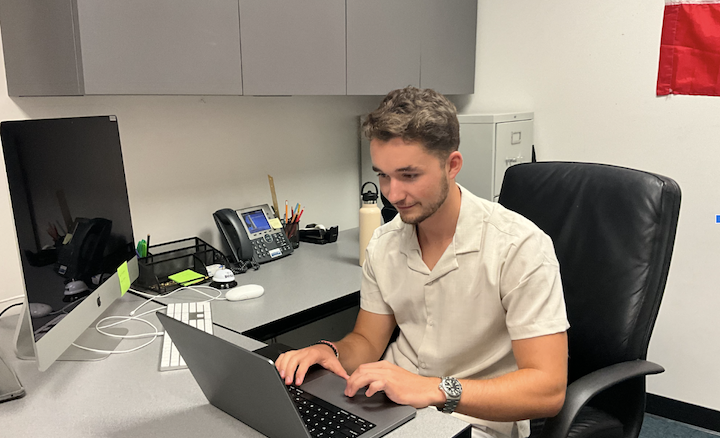
Finance majors spend a lot of time staring at numbers.
And it is paying off — finance majors at Pepperdine are learning to invest, communicate and navigate the stock market while simultaneously building their career portfolios. As they derive these skills in their classrooms, they are preparing themselves to venture into prominent industries where they will navigate numbers and relationships.
“Lot of quantitative work that we take from our classes, take from real-life experiences and we can put it into projects that we put into a variety of different realms,” senior finance major Zara Raza said.
Students are drawn to the field of finance because of its distinctiveness and versatility in a myriad of career fields.
What draws students into finance?
Finance, accounting and economics are all majors that teach students how businesses and the economy work, but finance degrees focus on how to make a profit, Bryan M. Kuderan wrote in a March 2023 Harvard Business Review article. Finance manages the acquisition and spending of money, whereas accounting records the movement of money, and economics studies the production and distribution of money.
Raza initially entered Pepperdine as a business administration major but switched to finance after her father advised her to be part of a more defined field in the business industry.
“I like math, I like money, I like numbers,” Raza said. “So you put them all together and that’s how I ended up switching to finance.”
Junior finance major Kilian Pankowski also had intended on being a business administration major, but switched to finance.
“I like numbers more specifically and I feel finance is a more concrete skill set than other majors such as business administration,” Pankowski said.
Junior finance major John Fadal decided on his finance major after being introduced to investing in high school.
“During my high school career, I began to fall in love with the financial space,” Fadal said. “I learned about investing and I’ve always been in love with that ever since.”
Others chose finance later in their lives. Finance Professor John Ned pursued a PhD in finance from University of Texas, Rio Grande Valley, after an undergraduate degree in accounting and 20 years of experience in the banking industry. His experience showed him a correlation between accounting and finance.
“Seeing how accounting and finance are so closely related, that’s why I went the finance route and not accounting when I decided to pursue a PhD,” Ned said.
While there is a distinction between business administration and finance, the majors do overlap. Bryan Hulit, a senior business administration major, has a lot of experience within finance from his youth and is currently gaining experience through his courses and extracurricular activities.
“There are a lot of parallels between the business administration major and finance major,” Hulit said. “But I would say for me personally I always loved exploring both those avenues to really be more diversified for the workplace in the future.”
What experience are finance students gaining in their classes?
In their courses, finance students are gaining experience in investing. As they learn to navigate decisions about how to allocate investments, they also acquire knowledge in various areas of finance, including financial news and reasoning.
In Ned’s accounting and finance for non-business majors course, students participate in simulation investing through a platform called StockTrak. Students are placed in groups and assigned a portfolio worth $500,000 that they have to manage for the semester with the goal of achieving the highest return on investment. Students have to make at least six trades a week within their portfolio in different industries. Ned said he advises his students to keep in touch with current events within particular industries to inform their decisions.
“If you can find recent announcements, then that can possibly explain the volatility within stocks,” Ned said.
In her financial management class, Raza and her group compared the stocks of Coca Cola and Pepsi through risk analysis and financial ratios to determine which company an investor should choose. Their analysis of its annual and financial reports, stock valuations and risk analysis led them to choose Coca Cola as the better investment.
“It was a really good amount of work that helps set you up to really realize how much work goes into figuring out what stocks you put in a portfolio and what measures you take to understand the risk of taking on certain stocks,” Raza said.
In his investments class, Hulit and his peers are now actively managing a portfolio. They are looking at which stocks are best to buy and making decisions regarding their short- and long-term views of the companies.
“In general, just doing a lot more analysis on the stocks to see if it’s a good investment or not,” Hulit said.
How are finance majors using their skills in their real lives?
As a finance student, Fadal said he likes to be involved and informed. He participates in meetings that provide him a broader perspective on the finance field, such as the Klynveld, Peat, Marwick, Goerdeler (KPMG) accounting firm meeting his accounting professor invited him to. He takes advantage of student resources such as The Bloomberg Terminal. He is also a member of WavePool, Pepperdine’s investment club. Fadal has come up with his own investment strategy and put it into practice.
“What I’ll do is I’ll use that investing strategy to make investments,” Fadal said. “What I’ve recently done is invest in the financial technology space with PayPal.”
Fadal has had significant gains in PayPal because it is a singular company that is heavily impacted by the federal interest rates. Recently, the Federal Reserve, which governs interest rates, cut rates, which has propelled a significant growth in Paypal’s stocks and, consequently, increased Fadal’s gains.
Hulit started investing in stocks at 16, which allowed him to develop favorite companies. Through his Pepperdine courses, he enhanced his understanding of investment values.
“I am constantly adding on additional stocks to my portfolio and using all of my class concepts to really say, ‘Let’s look at a more analytical approach when looking at stocks compared to more of an emotional based,’’’ Hulit said.
Hulit’s skills in investing have evolved with the experience he has gained over the past six years. Through thorough analysis and understanding of the companies he invests in, Hulit said he has been able to produce incredible returns.
What kind of internships and jobs are finance students getting?
Studying finance helps students understand dynamics within companies. Pankowski is the advertisement director for Pepperdine Graphic Media. There, he organizes the promotions of campaigns and local businesses in the Graphic Newspaper. As a finance major, he has gained an understanding of how companies budget, which has helped him when selling advertisements.
“If I am going to ask someone for a big contribution in let’s say October, I need to understand that probably in their cycle their budget for advertising is nearing to an end since it’s closer to the end of the year,” Pankowski said. “So if I want to do a big project for them, I can ask for that in January when they reset their advertising budget.”
Pankowski works in insurance sales for New York Life, the third largest life insurance company in the United States. He is also working on getting himself licensed for working in the financial services industry, selling mutual funds, annuities and insurance premiums.
The summer after her first-year, Raza interned as an analyst at a hedge-fund that focused on investing in medical and scientific improvements. As an analyst, Raza took on her own stock that she researched and evaluated. Her work also involved sifting through financial reports and investor details.
”I think that’s where I learned I would rather do more computational work than analysis work,” Raza said. “Doing more computational work requires you to talk to people versus analysis work you’re just pulling information and then presenting that information. It’s not a lot of discussion.”
Ellya Asatryan reported this enterprise story in Jour 241 during the Fall 2024 semester under the supervision of Dr. Christina Littlefield and Dr. Theresa de los Santos. Dr. Littlefield supervised the web article.




